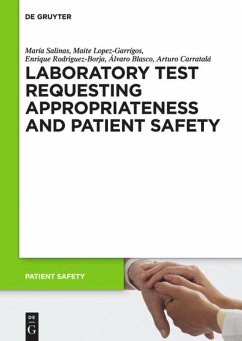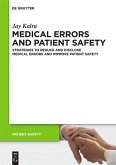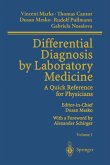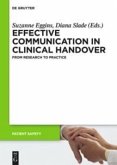The global medical process is a chain of different medical multidisciplinary procedures. The success in global Patient Safety will depend on the Safety of the consecutive medical processes that intervene in this complex system. Laboratory data is an essential part of health care, indeed it is used in 70% of
clinical decisions. As the global medical process, Clinical Laboratory is also a multiphase procedure, called "brain to brain loop" or "total testing process". It begins when the ordering physician figures out the appropriate tests to be requested, according to the medical history and the physical examination, and it ends when he thinks, again, how to interpret the test results. If a test is not
appropriately requested any effort to improve the quality of the following phases is trivial.
Inappropriate laboratory test over requesting is extremely frequent. The prevalence of under requesting has been less studied. The consequences of under requesting are clear, we are missing a diagnosis. However, inappropriate over requesting does not only result in a problem of cost. While
the laboratory intervenes in 70% of clinical decisions, it only accounts for a very small proportion of the overall health-care costs. In spite of that, the consequences false positive results can produce devastating damage. The anxious patient will undertake a long journey to perform additional diagnostic tests, generally more expensive than the original one, or new medical consultations, to finally, and luckily, be diagnosed as healthy, after going through the cavalry of the "Ulysses syndrome". Another most damaging option is to continue through the "Imaginary Invalid syndrome" or to become a "Person with abnormal laboratory value". Eventually, a very cheap test request could lead to a very expensive situation. In essence, inappropriate over requesting can result not only in a problem of cost but also in a problem regarding patient safety. Additionally, another important consequence of inappropriate tests over requesting is that such amount of unnecessary tests has
probably contributed to a significant increase in the volume of those over the last years. Such an overload can result, on the one hand, in the laboratory delivering simply laboratory data instead of interpreted meaningful clinical laboratory information. The laboratory may become a data dispensing machine instead of a modern organization issuing personalized information related to the patient and test special characteristics. On the other hand, unnecessary tests laboratory results can hide really clinically meaningful laboratory information.
In all, there is general consensus that the inadequacy of test requesting must be corrected through strategies and monitored over time through indicators to assure the optimal laboratory contribution to clinical decision-making and patient safety.
clinical decisions. As the global medical process, Clinical Laboratory is also a multiphase procedure, called "brain to brain loop" or "total testing process". It begins when the ordering physician figures out the appropriate tests to be requested, according to the medical history and the physical examination, and it ends when he thinks, again, how to interpret the test results. If a test is not
appropriately requested any effort to improve the quality of the following phases is trivial.
Inappropriate laboratory test over requesting is extremely frequent. The prevalence of under requesting has been less studied. The consequences of under requesting are clear, we are missing a diagnosis. However, inappropriate over requesting does not only result in a problem of cost. While
the laboratory intervenes in 70% of clinical decisions, it only accounts for a very small proportion of the overall health-care costs. In spite of that, the consequences false positive results can produce devastating damage. The anxious patient will undertake a long journey to perform additional diagnostic tests, generally more expensive than the original one, or new medical consultations, to finally, and luckily, be diagnosed as healthy, after going through the cavalry of the "Ulysses syndrome". Another most damaging option is to continue through the "Imaginary Invalid syndrome" or to become a "Person with abnormal laboratory value". Eventually, a very cheap test request could lead to a very expensive situation. In essence, inappropriate over requesting can result not only in a problem of cost but also in a problem regarding patient safety. Additionally, another important consequence of inappropriate tests over requesting is that such amount of unnecessary tests has
probably contributed to a significant increase in the volume of those over the last years. Such an overload can result, on the one hand, in the laboratory delivering simply laboratory data instead of interpreted meaningful clinical laboratory information. The laboratory may become a data dispensing machine instead of a modern organization issuing personalized information related to the patient and test special characteristics. On the other hand, unnecessary tests laboratory results can hide really clinically meaningful laboratory information.
In all, there is general consensus that the inadequacy of test requesting must be corrected through strategies and monitored over time through indicators to assure the optimal laboratory contribution to clinical decision-making and patient safety.








